Darknet or dark web marketplaces are a hidden part of the internet that surface web users can’t access; they can only be accessed with special anonymity software called Tor. Many people (mostly criminals) use these sites to perform illegal transactions such as selling banned goods and services. For secrecy, they mostly use cryptocurrencies for payments.
These markets have started their journey from the Silk Road and AlphaBay, and have come a long way since then.
Although these marketplaces are continuously shut down by law enforcement agencies, they still work today. Interestingly, new sites get more hype, and it even becomes difficult to shut them down, as they have better security than the older ones.
We will be exploring the top 10 Dark Web markets in this article. From items like drugs, fake ID cards, and hacked bank accounts to more complex offerings like human trafficking, these sites carry all the illegal activities you can think of.
These marketplaces are full of risks (security, legal, ethical issues – all of them). For this reason, we don’t recommend using them. But if you still decide to access these websites, for education or research purposes, make sure you stay cautious.
Please note: This article is intended for information and education only as staying informed is the best guard for users online today and knowing the problem, illicit marketplaces in this case, can help stay secure as we reasoned later in this article. PrivacySavvy never supports, encourages, or promotes any illegal platform or activity.
The top darknet markets – Quick list
- Awazon Market: A rapidly growing darknet marketplace that security researchers spotted not too long ago. It facilitates anonymous sell and purchases of illicit good and services.
- Torzon Market: Another top market you can find on the dark web that lists mostly illegal items.
- WeTheNorth: Started from Canada, the market is now serving worldwide.
- Russian Market: Here, you will find a lot of stolen cards and card information.
- Brian’s Club: Another top dark web marketplace that lets you buy information about stolen credit and debit cards
- STYX Market: The market provides maximum security for its buyers with its anonymous payment method.
- Abacus Market: It is famous for its illegal selling of passports, drugs, and more.
- Vice City: A new and top darknet market that mainly focuses on users’ privacy and anonymity.
- Exodus Market: One of the oldest marketplaces that is operational in more than 100 countries worldwide.
- Biden Cash: The market is used for illegal transactions, carding, and other financial transactions./alet
What is the darknet market?
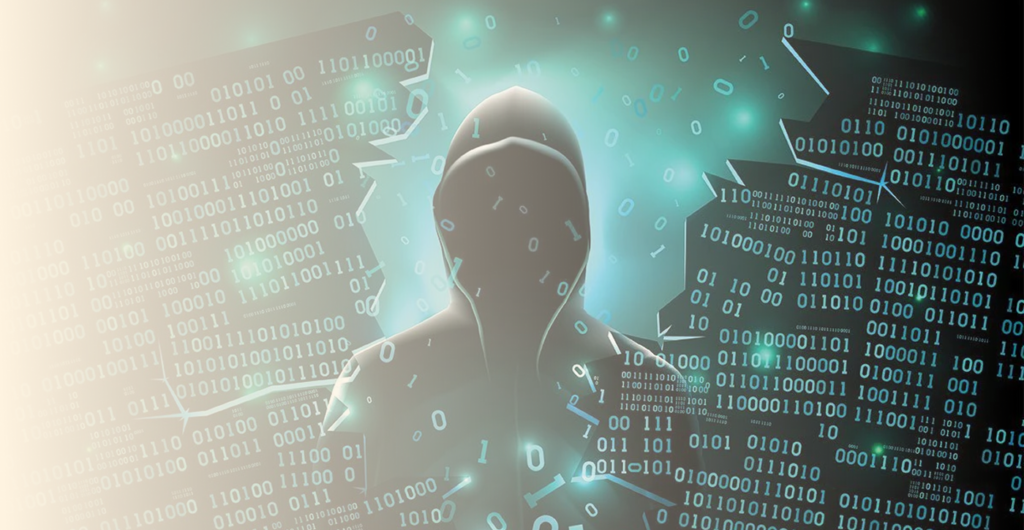
Imagine an underground version of your favorite online marketplace, somewhere hidden, exclusive, and often operating outside legal boundaries. That’s what a darknet market (also known as DNM) is. It is similar to an online store, except it’s not the type you’ll find with a quick Google search.
Darknet markets are decentralized trade networks on the dark web, so you won’t find them the way you can expect to find online stores like Amazon or eBay on your average search engine.
But here’s where it gets tricky. Unlike regular e-commerce sites, markets on the dark web often deal with illegal or highly restricted goods and services, such as fake documents, hard drugs, and hacking services. Sure, you might come across listings for legit products like handcrafted jewelry or digital art, but those are few and far between.
So, what even is this dark web, and why are these marketplaces present there? Let’s discuss that next.
What is the dark web?
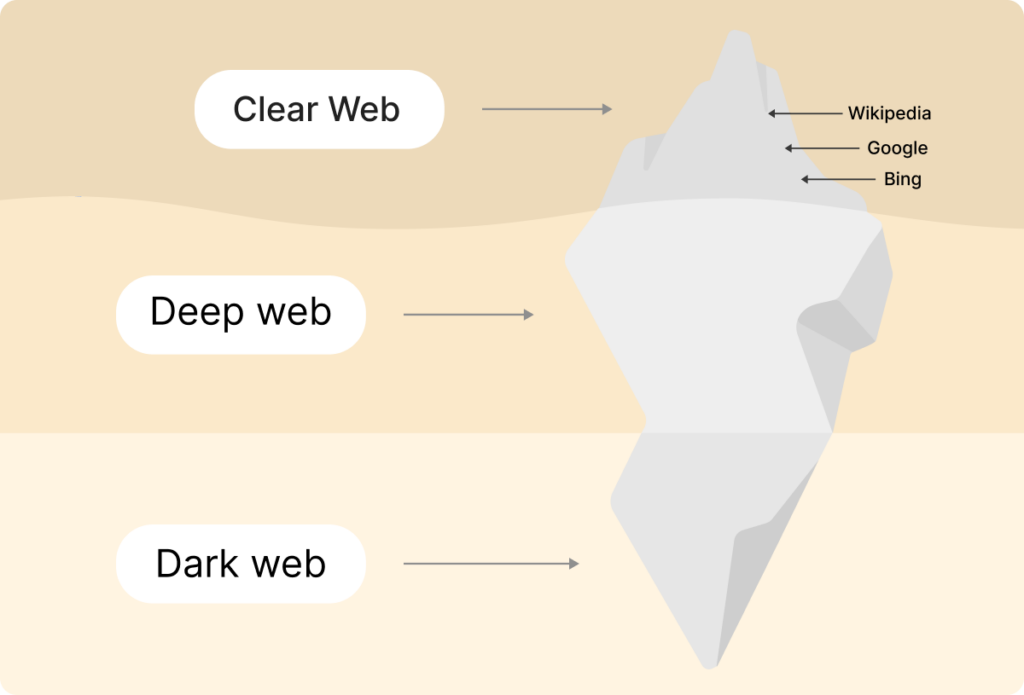
The dark web is a hidden section of the internet that you cannot reach with common search engines like Bing or Google. The only way in is through the use of special software that renders all users anonymous and untraceable. Most people use Tor, which stands for The Onion Router.
The dark web itself is not illegal, but it’s largely connected with unscrupulous and illegal operations. That’s why it has such a foreboding and even dangerous reputation. It is used by many for buying or selling items that are prohibited on the regular internet, like fake IDs, illegal drugs, and stolen data.
Of course, not all the popular and widely-used dark web sites and things like marketplaces on the dark net are illegal. Some use them due to privacy concerns, such as journalists talking to informants or whistleblowers, while others may simply want to protect their confidential information from observation or tracking. Nevertheless, most people on the internet do not need to communicate or venture into the dark web.
Why are darknet markets found on the dark web?
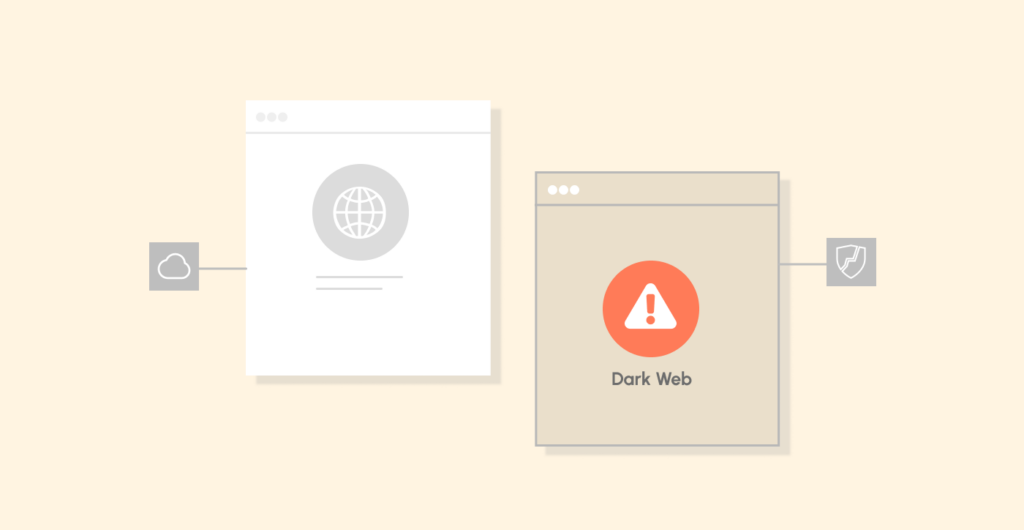
Now that you understand what the dark web is all about, you might wonder why other people do things on it. Darknet marketplaces like to exist on the dark web because it offers a service that the regular internet, or more accurately, the “surface web,” does not. Which is what exactly? Anonymity and privacy.
The dark web is designed in such a manner that it hides the identities and locations of its visitors. This extra privacy makes it much harder for authorities to track down who runs these markets and where they are located. For these reasons, most of these stores naturally like the dark web due to its protection.
Now, that is not to say illegal behavior is completely beyond detection. Authorities do have means of catching cybercrooks. The dark web combines encryption, anonymity, and hidden doorways to provide the perfect sanctuary for such illicit activity compared to the usual internet, which is more vulnerable and trackable.
Popular dark web marketplaces of today – Detailed list
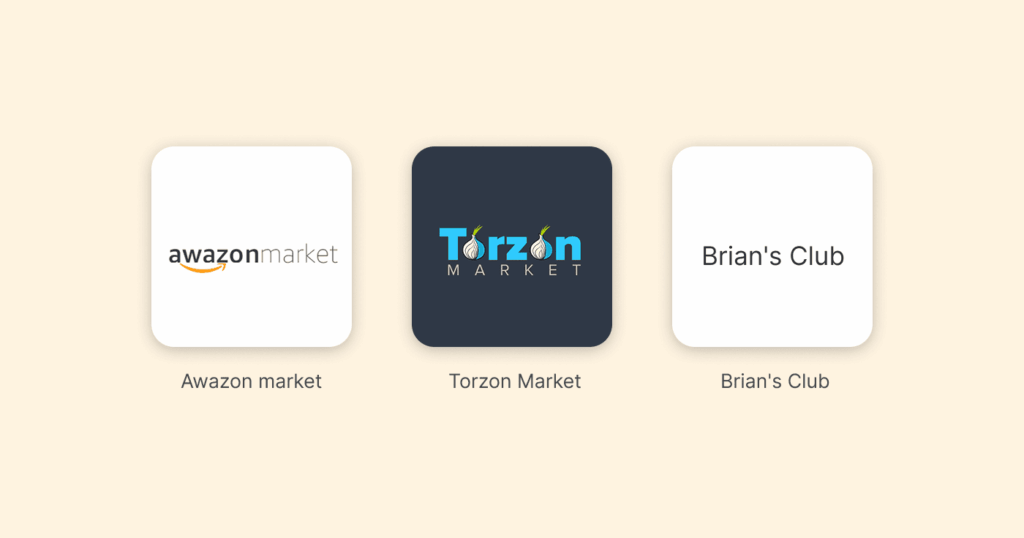
Are there any darknet marketplaces still operational in 2026? A new dark web marketplace erupts every now and then. Security researchers are monitoring hidden forums and communities where cybercriminals gather to investigate the top sites in service. Here are some of them:
1. Awazon Market
- Direct link 1: awazonevlc63543fjvtli35bk2iopdyyaaytkmmiop5avny6b24uljqd.onion/auth/register_now
- Direct link 2: awazone7gyw54yau4vb6gvcac4yhnhcf3dkl3cpfxkywqstrgyroliid.onion/auth/register_now
- Direct link 3: awazonep3val6gxuzcl2ydllhnwb7quh5ynh76cyc3axkfoqhlbrb2id.onion/auth/register_now
Established in 2020, Awazon Market has quickly become one of the most famous darknet marketplaces. The market claims to provide secure and anonymous commerce services. You can find a lot of goods and services packed with stealth high-level encryption, no JavaScript, and anti-DDoS protection. This ensures a maximum level of privacy.
The marketplace requires registration. Understandably, as in the case with most illicit trade markets, you don’t even need to verify your email Awazon. It has a simple interface with several advanced features.
It has a search option to let you find local and international products and services on the dark web. A lot of vendors from all over the world are registered here, offering an extensive range of products, including digital services, security tools, and other equipment. For those who are looking for a reliable Alphabay Market alternative, Awazon Market aspires to become the solution.
2. Torzon market
- Direct link: https://torzon4kv5swfazrziqvel2imnxcckc4otcvopiv5lnxzpqu4v4m5iyd.top/index.php
Torzon Market showed up on the dark web in September 2022, and it’s been growing steadily ever since. These days, it lists over 11,600 illegal items, including hard drugs, hacking tools, and all kinds of cybercrime services. It also runs on the Tor network, which helps keep things anonymous.
One interesting aspect about Torzon is how it builds trust. It brings in vendor reviews from other places and verifies them using PGP signatures, so buyers can feel a bit more confident about who they’re dealing with. There’s also a premium account option for users who want extra benefits. And when it comes to paying, the site sticks to Bitcoin (BTC) and Monero (XMR) to keep transactions private.
3. WeTheNorth
- Direct link: http://hn2paw7qy4prhgvqikn6dqujbsxdar7cwsgk3kmew2bxu4haj4jyykid.onion
While this market started in Canada in 2021, WeTheNorth now sells to both Canadian and international users. It’s a market for fake documents, hacking software, and financial fraud services. WeTheNorth has a strong community vibe, with an active forum where users interact and share updates. But it’s not open to just anyone.
Plus, there’s a thorough vetting process for new buyers and sellers to keep the community more secure. In a way, it feels more like a private club than an open market, and that’s exactly how the operators want it.
4. Russian Market
- Direct link: http://rumarkstror5mvgzzodqizofkji3fna7lndfylmzeisj5tamqnwnr4ad.onion/login
Don’t let the name fool you. The Russian Market isn’t exclusive to Russian-speaking clients. In fact, everything is in English, and the site picks up users everywhere in the world. What sells there? People visit this market to buy stolen credit cards, personal data, remote desktop account credentials, and logs gathered from information-stealing malware.
You can even find things such as BIN checkers and PayPal cookie converters. Another reason the Russian Market is so popular is that it’s pretty inexpensive compared to other dark web marketplaces.
5. Brian’s Club
- Direct link: https://brians.cc/register
Just as there are new entrants, the dark web has its veteran markets too, and Brian’s Club is one such market. It has been in operation for more than a decade since its debut in 2014. Brian’s Club is one of the best place to buy stolen credit card info, including CVVs, dumps, and even full account packages without revealing your identity.
The marketplace supports multiple payment methods, including Bitcoin (BTC), Litecoin (LTC), and Cryptocheck. They add new batches of stolen data every other week, and there’s even a bidding system where buyers can place offers on new data batches as soon as they become available.
6. STYX Market
- Direct link: N/A
Wondering if there’s an OG darknet market for financial crimes? Cybersecurity experts believe STYX is the one. The market facilitates trades in stolen credit card data, hacked bank accounts, and services to facilitate the laundering of cryptocurrency.
One of the things STYX is infamous for is having a rigorous verification process for users that makes it seem more exclusive. They even have a Telegram channel to provide their clients with live updates. How do people pay to employ their services? Like most of the markets, STYX supports Bitcoin (BTC), Monero (XMR), and other crypto tokens to keep everyone’s identity hidden on this marketplace.
It’s shocking to see they have multiple clear web addresses but no onion URL (tells you a lot about how complicated these illicit markets can be; they could be plotting users on the surface web who don’t have any security shield, like Tor in the case of onion sites, as they can’t be accessed without it). These markets are dangerous anyway and shouldn’t be accessed even if they’ve onion addresses.
7. Abacus Market
- Direct link: https://abacuseeettcn3n2zxo7tqy5vsxhqpna2jtjqs7cgdjzl2jascr4liad.top/
Next up is Abacus, another newer market that has already made a massive name for itself, especially following AlphaBay’s closure. It contains 40,000+ listings for illegal products (mostly) and is worth an estimated $15 million, so it’s one of the largest markets out there.
People go on to buy literally anything. Want to get illegal drugs, fake passports, Trojan, or other cyber attack software? Abacus Market is your sure plug.
8. Vice City
- Direct link: http://vicecitkf7sv4aosm6xfa4yjpwellcuqyyxwearrz44ufdecdqwhulad.onion/
Vicy City is a new but popular marketplace on the dark web. The site allows users to find and buy a vast variety of products and services. It’s known for its strong security features (like a trusted escrow system, PGP two-factor authentication) and anonymity.
Whether you want some pharmaceutical products (drugs) or digital items, you will probably find the products here, and that too at affordable prices. One of the site’s standout features is its customer support. Vice City listens to the problems faced by its customers and vendors and solves them so that they can keep using the platform with ease. To access the marketplace, dark web users must register first and pass the CAPTCHA test to prove they are human.
Vice City market places strong emphasis on privacy and anonymity. It supports cryptocurrencies like Bitcoin (BTC) and Monero (XMR) for a secure trading environment.
9. Exodus Marketplace
- Direct link: https://exodusmarket.io/login
This marketplace was launched in January 2024, and it’s been growing since then. It mainly sells stealer logs (malware software that is used to collect or steal users’ data).
These logs can collect sensitive information like credit card details, login credentials, local files, and cookie data. For this reason, the marketplace identifies itself as the key player in criminal activities like fraud.
Exodus Marketplace started to become popular after the shutdown of Genesis Market, and it replaced it successfully. It claims to control more than 7,000 bots from 190+ countries, with data prices ranging from $3 to $10, based on the quality it offers. The marketplace has a simple interface, lets users filter logs easily, and accepts Bitcoin, Monero, and Litecoin for payments.
One notable fact is that the site has changed its domain twice since its formation. This is to address security concerns and to improve its presence. Today, Exodus Marketplace works from 3 different domains, two of which are its mirrors.
10. BidenCash
- Direct link: N/A
BidenCash is another latest marketplace that started in 2022, and is now home to sensitive financial data transactions. This is where cybercriminals go to buy and sell things like stolen credit card numbers, personally identifiable information (PII), and even SSH login details. One thing that distinguishes BidenCash on the dark web, however, is how it markets itself.
The site gives out free samples of the stolen data every now and then to gain more customers. It also uses a strict authentication process to deter scammers. With its fast rise to fame and focus on money fraud, it’s no surprise that cybersecurity experts are keeping a very close eye on this one.
BidenCash was launched in 2022, and since it became a hot spot for cybercriminals to sell and buy illegal things, including stolen card information and personal data. However, in June 2025, BidenCash’s relevant domains (around 145) were seized by the US Department of Justice.
What do people sell or exchange on darknet markets?
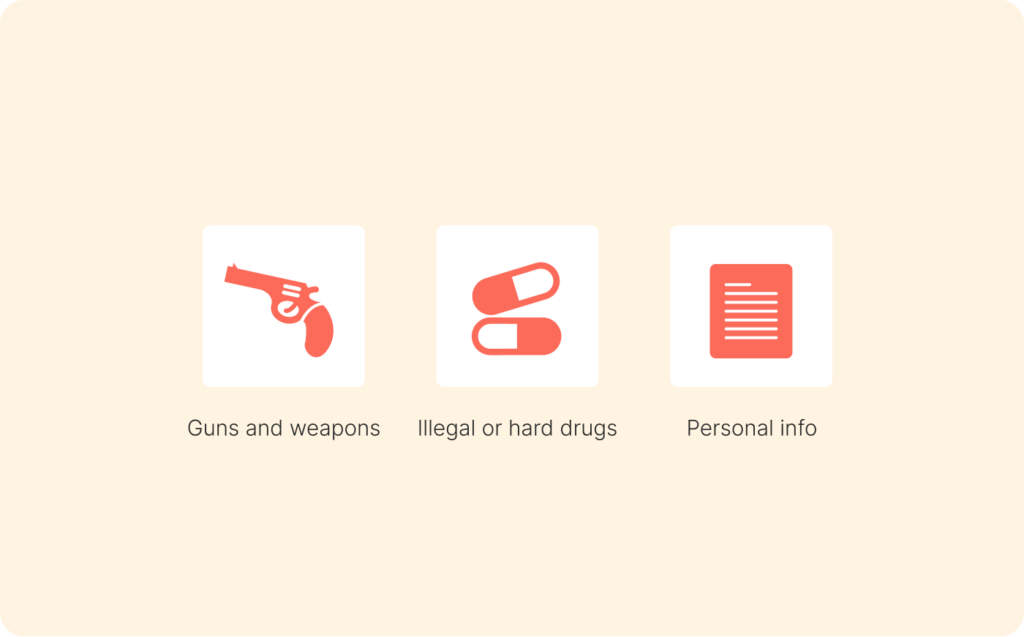
As we mentioned earlier, not everything sold on dark web markets is illegal. As terrible as its reputation may be, some vendors sell legitimate goods or services. Some people even use the dark web to make anonymous purchases, especially in areas where privacy is a huge concern. So, not everyone who shops there is looking for something illegal.
However, if we’re being honest, the majority of activity on darknet markets involves illegal or heavily regulated items. Most sellers sell illegal goods and services. A 2020 study found that almost 57% of sites on the Tor network hosted some form of illegal content.
Let’s review what exactly is being sold on these darknet marketplaces and identify their target buyers.
Guns and weapons
Surprisingly, most guns on the darknet actually start as legal products. That’s right. The UNODC (United Nations Office on Drugs and Crime) maintains that almost all firearms are originally manufactured through legal means.
But somewhere between production and purchasing, things can get dirty. For example, an insider or factory employee might quietly slip away with an unmarked gun and sell it online. Once it lands on a darknet marketplace, it becomes part of the illegal weapons trade.
Why do people buy weapons this way? In many countries, strict laws limit who can legally buy, own, or carry firearms. So when someone like a private buyer or criminal group can’t pass the background checks or get the right permits, they usually turn to the dark web to sidestep the rules and get armed without drawing attention.
Criminal hacking services
The dark web isn’t just a place for shady shopping. It’s also a marketplace for digital mercenaries; you’ll find everything from solo hackers offering their skills to well-organized groups that take on more complex or high-stakes projects. Some even have connections to criminal organizations and, in more serious cases, government-backed operations.
These hackers don’t hide in the shadows as much as you might think. In fact, many openly advertise their services on darknet forums. What can you hire them for? Anything from planting malware and stealing sensitive files to hijacking email accounts or breaking into social media profiles. Some services even target entire companies or public systems.
While hiring a hacker might sound like something out of a movie, it’s a very real threat. Businesses may use these services to sabotage their competitors, while individuals may seek revenge or simply want access to private information about someone.
Stolen personal information
These markets are a hot spot for selling stolen personal data. This can include everything from full names, email logins, and passwords to credit card details, social security numbers, and bank account information. The cybercriminals trade even sensitive documents, such as medical records, passport information, and driver’s licenses.
The fallout for victims whose data is stolen and sold can be devastating. They suffer losses such as identity theft, financial loss, and emotional distress due to damage to their personal and professional lives. Yet, for vendors on the dark web, it’s all about profit. They really don’t care about the loss and dilemma of the victims whose data has been stolen.
Explicit and illegal content
Unfortunately, the dark web hosts not only explicit but also deeply illegal and disturbing content. The markets often share materials related to child exploitation, pornography, and non-consensual recordings, all of which are serious crimes that inflict lasting harm on real-life victims. Such content fuels a dangerous cycle of abuse, violence, and exploitation.
As sad and gruesome as it is, the anonymity the dark web provides makes it much harder for law enforcement to track down and prosecute the perpetrators, take down the content, and help the victims. International agencies continue to work tirelessly to shut down such sites and prosecute offenders.
Still, the existence of this content is a grim reminder of the dark web’s potential for abuse when left unchecked.
Illegal or hard drugs
This is probably the most common category. The Guardian once reported darknet markets as the “eBay of drug dealing,” and that’s not far off. You can find every type of drug that is illegal. Whether it’s marijuana, LSD, prescription pills, or harder substances, you’ll always find them listed on these platforms just like products on Amazon.
Drug dealers can sell to customers across the world, not just locally. This expanded reach, combined with anonymity, only makes it easier for them to grow their operations without getting caught immediately.
Pirated files
If you take a quick look through darknet marketplaces, you’ll instantly notice an overwhelming supply of pirated content. It not only has last year’s hit movies or old albums. We’re talking about even early access to unreleased music, leaked TV episodes, concert footage, and even popular video games before they officially drop.
But it doesn’t stop at entertainment. Some sellers offer cracked versions of expensive software that you’d typically pay hundreds of dollars for. Others sell pirated eBooks, academic materials, and entire premium courses ripped straight from paid platforms.
The worst part? They sell these files for just a fraction of the original cost on the surface web or even share freely, which makes them tempting for people looking for shortcuts. While it might be tempting, remember that downloading such content has serious legal and cybersecurity risks.
How much is stolen data sold for on Darknet Markets?
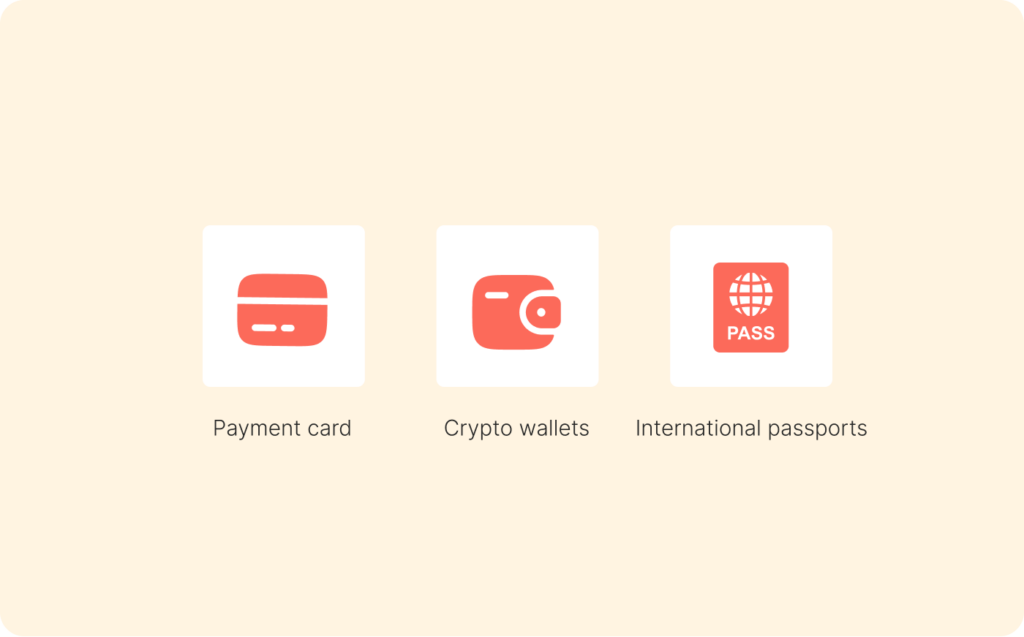
Reports on darknet show just how much sensitive data is valued on Darknet markets, and the prices are staggering. Hackers can make millions on the darknet by spending only a few bucks. Below are some prices of different items:
- Payment card data: This was the most sold product on the dark web, typically priced at around $10. Similarly, login details of online accounts and telephone numbers fall within the same range. For example, a stolen streaming platform account may be available for $10, while an Uber account would cost $12. People buy these accounts for free rides, subscription services, or other phishing scams.
- Crypto wallets: To everyone’s surprise, crypto wallets and exchange account logins are worth far more than regular bank accounts. Some of the most expensive digital commodities are Binance accounts, which sell for an average of $395; Kraken accounts, which sell for around $384; and Crypto.com accounts, which average $350.
- Personal and business addresses: When it comes to location data, the EU had the highest prices, with personal addresses selling for $11.40 on average and business addresses going as high as $200. The criminals buy this data so that they can impersonate someone or steal from companies by sending fake invoices or phishing emails. US voter emails, however, surpassed those of the EU and other countries, with an average price of $99.
- International passports: As you may have expected, passport copies top the chart as the most expensive single items. They typically average $600, though the exact price depends on the country of origin. For instance, Argentinian passports cost as little as $9, while Lithuanian, Slovakian, and Czech Republic passports were the most expensive, reaching up to $3,800. Those who purchase stolen passport scans use them to create fake accounts or travel under false identities.
5 common scams and fraudulent activities on darknet markets
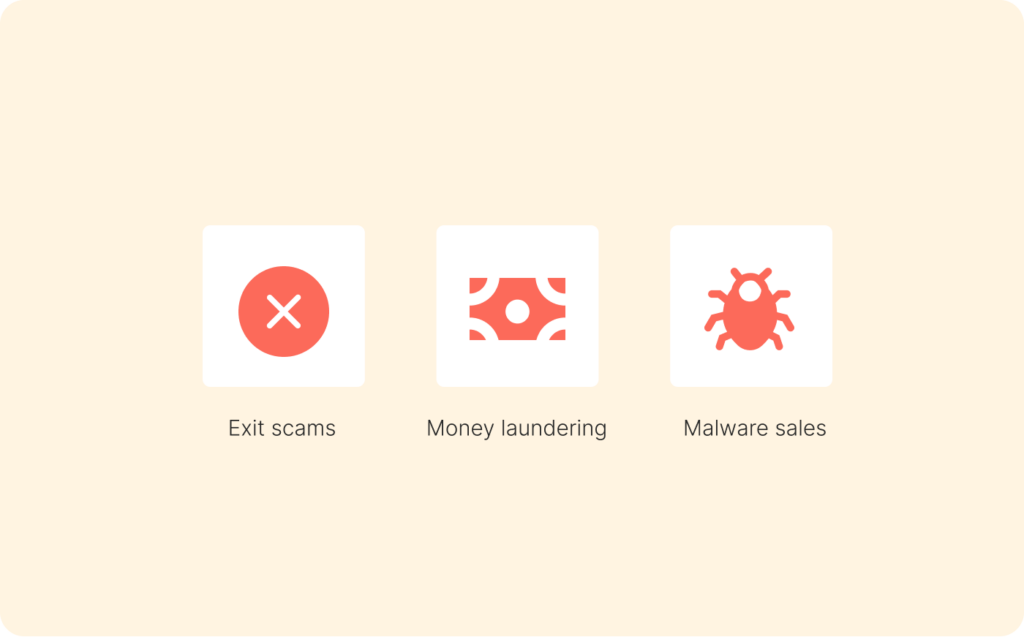
1. Exit scams
Imagine trusting a site where you’ve been buying or selling for months, and everything seems legit. But one day, without warning, the site vanishes. That’s an exit scam. Some marketplace operators first build trust by running a legitimate platform.
Once many users begin to rely on the site and store funds in escrow, the operators disappear, taking all the money with them and leaving their customers and clients with nothing.
2. Money laundering
Sometimes, people visit the dark web to move dirty money. Some vendors offer services to help people “clean” illegally obtained funds using cryptocurrency and fake transactions. They mix and transfer funds through various privacy wallets and escrow services to hide the original source and make the illicit transactions harder to trace.
While this may all sound sophisticated, it is a financial crime and very risky. Those who use these services can still be traced and prosecuted if caught, especially as law enforcement continues to sharpen its tracking tools.
3. Ponzi schemes
Too-good-to-be-true investment offers are another classic scam on the dark web. Ponzi schemes promise high returns with little to no risk. Early participants may see some profit, but that money usually comes from new victims, not actual earnings. Eventually, the system collapses, and most people lose their entire investment. So, if a “business opportunity” sounds too perfect, it probably is.
4. Malware sales
Many people go to the dark web to buy things they can’t find elsewhere, but what if what you’re buying is also trying to harm you? That’s the reality with malware sales. Scammers on darknet markets claim to offer legit tools or services, but instead provide you with malicious software that can infect your device.
Once you unknowingly install the spyware or ransomware, they can steal your identity or even hijack your crypto wallet.
5. Phishing attacks
Just like on the regular internet, phishing is a big problem on the dark web as well. How do they plan these attacks? Fraudsters create fake versions of popular darknet sites to trick users into entering login details or personal data. If you fall for it and log in, they immediately steal your credentials and either sell or use them for other scams.
On the dark web, even a minor slip-up can cause you big consequences. So, you need to be extremely cautious because the fake sites are often very similar to the real ones, making them dangerously convincing.
The anonymity and lack of rules that define darknet marketplaces are exactly what make them breeding grounds for fraudulent activities. Of course, the promise of secrecy and unfiltered access might lure you in, but those same features are what make the environment so risky.
If for any reason, you decide to visit these hidden corners of the web, ensure you at least study and understand the common traps. Getting familiar with the tactics scammers use will go a long way in helping you protect your online data and assets.
Remember, staying informed is your best defense against misinformation. When you know what to expect, you’re less likely to fall for a trick and should be able to keep your identity safe.
Did the Silk Road marketplace go under?
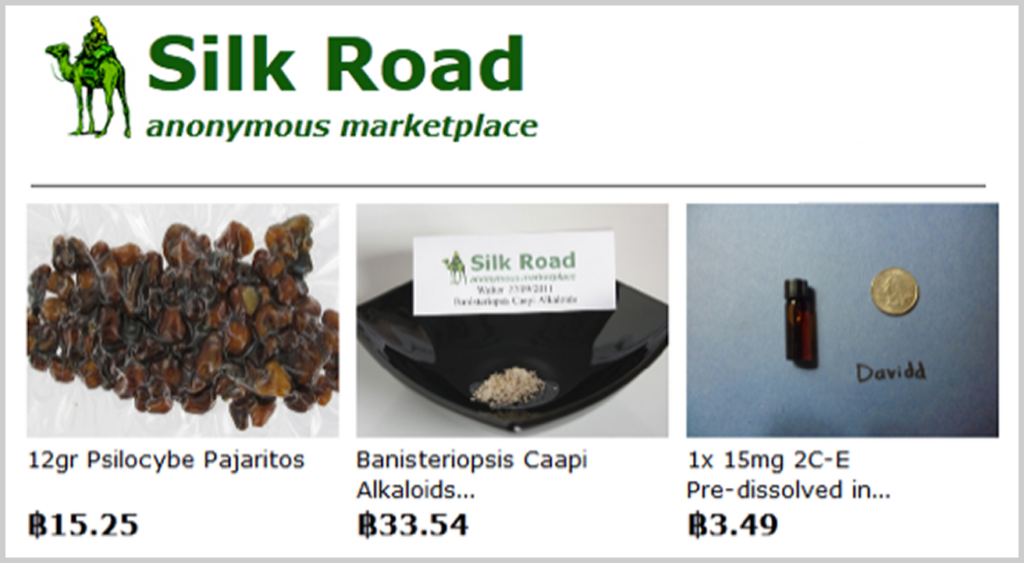
You probably wouldn’t know of Silk Road if you’re new to darknet marketplaces. It was the first big one and the original trailblazer. You could call it the Amazon of the dark web, but it worked only on the Tor browser. Anyone could buy and sell products or services anonymously using Bitcoin.
While you could find all sorts of products on Silk Road, drug sales quickly became prevalent because of the profits it raked in. In fact, by 2013, a Guardian article revealed that about 70% of listings were drug-related. But, like all things in the underworld, it didn’t last.
Later, in 2013, Silk Road caught the attention of law enforcement and policymakers like US Senator Charles Schumer, who publicly called for a federal crackdown. That push led to the arrest of Ross Ulbricht, the founder of Silk Road, after a long and intense investigation.
Ulbricht faced several serious charges, including distributing illegal drugs, running a criminal enterprise, hacking, trafficking fake IDs, and money laundering. In the end, he was sentenced to life in prison for running one of the largest and most scandalous dark web cases in history.
Even though Silk Road is long gone, its impact is still here. It became the blueprint for other dark web marketplaces that tried to take its place. But just like Silk Road, many of them didn’t last forever.
Here are a few that followed in its footsteps and quickly met the same fate:
- Silk Road 2.0: This was supposed to be the comeback version of the original Silk Road and debuted just one month after the original’s shutdown. But the police took it down too in 2014, about a year later.
- Black Goblin Market: This market joined the dark web in 2014 but went down shortly after because of a serious security flaw.
- Utopia: Utopia barely got a chance to exist. It went live in 2014 but stopped operations just eight days later after undercover agents infiltrated the site.
Why is it critical to monitor dark web marketplaces?
How dark web markets fuel the cybercrime supply chain
The marketplace as an arsenal
If you think the Dark web marketplaces are just online shops, you’re wrong — these sites are the actual weapon stores for criminals. They provide criminals with access to everything they need, from launching attacks to stealing data, etc.
What criminals buy and how they use it
1. Stolen credentials (usernames, passwords, cookies)
Criminals can use the dark web to hack or steal email, social media, and bank accounts. They can either hire a hacker or buy software for this activity.
2. Ransomware kits
On the dark web, you don’t need to be a technical expert to design ransomware, and that’s dangerous. Even people with little to no knowledge can buy ready-made ransomware and launch attacks on their victims. They then use it to blackmail users until they pay a ransom.
3. Malware
Like ransomware, criminals can buy software and inject your devices with viruses. With it, they can spy on people, steal their sensitive data, or secretly control their devices. These software are also capable of launching DDoS attacks and phishing campaigns.
4. Zero-day vulnerabilities
Hackers are always finding loopholes. Once they identify it, they can break into your systems. What’s more concerning is that most of the time, we don’t know about these flaws, and by the time we try to fix them, we come to know it’s too late.
Making cybercrime easy for anyone
As mentioned earlier, launching a cyberattack doesn’t require any hacking skills. Even people with zero technical knowledge can buy phishing kits, ransomware, or stolen logins. This is just like you’re doing online shopping. You only need to have crypto, and you’re good to go.
The crime supply chain
Like Amazon and Daraz, crime on the dark web works through a proper supply chain. It starts with the producers who develop malware and data thieves who create or steal digital products.
From there, these products are then passed on to distributors, which are the dark web marketplaces in this context. On these marketplaces, they’re listed, sold, and promoted just like items on any e-commerce site.
The buyers, or “consumers,” are cybercriminals who use these tools to launch illegal activities. And the final link in the chain? The victims, who are common users, businesses, and even banks, who end up paying the price.
This can be stopped if law enforcement agencies can break any link, particularly dark web marketplaces, in the chain. Hence, it should be the top priority to track these platforms and shut them down as quickly as possible.
How complex are dark web marketplaces currently?
According to a recent trend, the dark marketplaces faced a decline in revenue. Chainanalysis, a blockchain analysis firm, conducted research that shows that the revenue decreased from $3.1 billion (2021) to $2 billion (2024).
A pure dedication from law enforcement companies helped take down several dark web marketplaces. Hydra Market, a popular Russian-language marketplace that generated almost $1 billion in revenue, was also shut down in 2022.
After that, many other marketplaces kept trying to take its place and become the top dark web market. However, legal bodies and law enforcement operations made this impossible and shut down these illegal communities. Genesis Market and BidenCash, two top dark web marketplaces, were also shut down in 2023 and 2025, respectively.
However, the dark web is so complex and vast that if law enforcement takes down one market, it pops up elsewhere. For instance, after the closure of Genesis Market, its website came back after a few weeks. If someone has the market’s code to the infrastructure, no matter how much effort law enforcement puts in, it will keep coming back on another server or can be built again with the same branding.
But these efforts of law enforcement don’t go in vain; hackers and criminals lose trust if a website or marketplace goes down.
Are darknet marketplaces still relevant?
Telegram has become a new frontier black web. This explains how the market of the dark web marketplace is affected. As Telegram has end-to-end encryption and anonymous profiles, it makes it an ideal choice for threat actors and hackers to take advantage of.
Despite Telegram’s anonymity, the dark web is still a hot spot for illegal trading of malware, illicit goods, and stolen data (such as stolen credit card information). Even with the increase in law enforcement pressure, the dark web market still achieved a revenue of $2 billion in 2024. Therefore, as long as this dark part of the internet exists, these marketplaces will flourish and emerge.
Is there a future for dark web marketplaces?
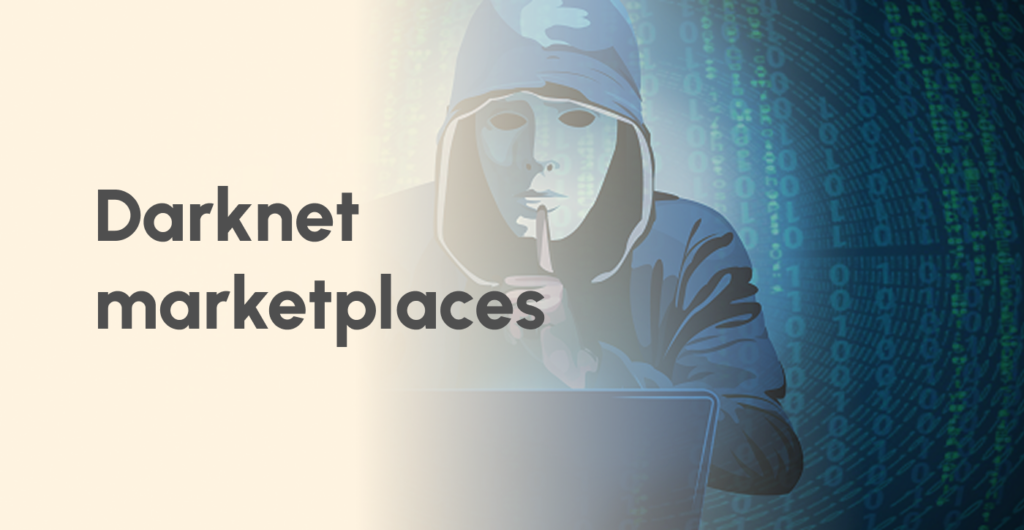
Even after Silk Road went down, dark web marketplaces haven’t slowed down. In fact, more of them keep popping up and gaining traction. Stopping their growth takes serious effort from US agencies like the FBI, often working hand-in-hand with international law enforcement.
Take 2022, for example. German authorities, working with the FBI, successfully took down Hydra Market, which at the time was the biggest and oldest dark web marketplace. It was a major win. But did it stop others from rising? Not quite.
These days, dark web forum admins are stepping up their game. They’re tightening security and carefully screening anyone who wants to join. This vetting process helps keep the community “clean” from spies, law enforcement, or anyone who might pose a risk. It’s like a private club now. The more secretive and exclusive, the better.
Still, even with these crackdowns and better defenses, dark web markets just keep coming back. One gets shut down, and another takes its place. That cycle hasn’t changed. Why? Because the demand is still there. As long as people want to buy and sell illegal stuff online, be it stolen data, narcotics, drugs, or malware, these markets will keep resurfacing, no matter how many times authorities take them down.
How can I protect my personal data online?
Let’s be real, your personal information might already be going around on the dark web. Between data breaches, malicious software, and phishing scams, it doesn’t take much for your sensitive information to end up in the wrong hands.
Sometimes, you might be hacked by using weak passwords or even just connecting to unsecured Wi-Fi on public networks. And in a world where almost everything we do is online, taking your digital privacy seriously is more important than ever. So, what can you do? First things first, always use strong and different passwords for each account you open.
Then, you can set up 2FA (two-factor authentication) for that extra touch of security in case someone somehow figures out your password. What else? If you ever have to connect to public Wi-Fi, make sure to use a VPN to keep your browsing safe and private.
And, of course, think twice before sharing too much personal details online. Even the smallest details about you can be useful to cybercriminals. That all is for general internet activities, you can guess how crucial having a VPN is when you hop onto something like the dark web.
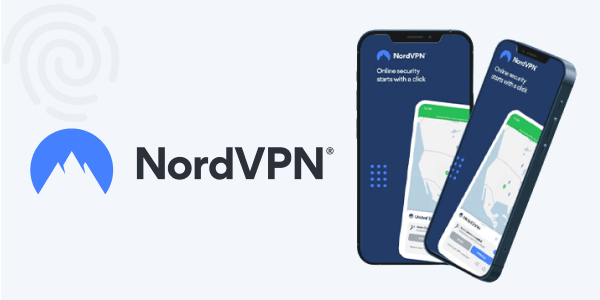
If you want more peace of mind, NordVPN has a dark web monitoring tool you can consider using. This handy feature monitors the dark web for signs that your login details or other personal info have been leaked.
It scans darknet marketplaces and hacker forums to alert you instantly if anything shows up. This way, you can catch any leaks and stop them before they cause bigger problems.
Do you already have a NordVPN subscription? To turn it on, just go to the “Settings” and then the “Tools” section of the NordVPN app and activate “Dark Web Monitoring.” In the end, it’s all about staying one step ahead. The more proactive you are, the better you can protect yourself against identity theft and other cyber threats.
FAQs
Cybercriminals go on dark web marketplaces to buy and sell illicit goods and services. They engage in financial crime and sell other people’s stolen personal information, since they’re under the veil of anonymity.
The majority of people on these markets use cryptocurrencies. Monero and Bitcoin are two of the most commonly used digital currencies on the dark web markets. Due to being the most popular and the oldest coin, Bitcoin is traceable. However, Monero, on the other hand, is untraceable and the most trusted payment method on these markets. Therefore, most cybersecurity experts recommend using Monero while shopping on darknet markets.
If you’re using a browser like Tor and visiting .onion websites that aren’t accessible through regular search engines or browsers, you’re likely on the dark web. These sites often look basic or outdated, and their URLs are lengthy strings of random letters and numbers. Keep in mind that visiting the dark web isn’t illegal, but engaging in criminal activity there is.
People use the dark web for both legal and illegal purposes. On one hand, it offers privacy for whistleblowers, journalists, and citizens in oppressive countries. On the other hand, it’s notorious for enabling illegal activity, including drug sales, weapons trafficking, counterfeit ID trading, hacking services, and the exchange of stolen personal data.
You can use dark web monitoring tools, such as NordVPN’s Dark Web Monitor, to check if your data has been leaked. These tools scan dark web forums and marketplaces for any signs of your compromised credentials. There is no need to visit darknet marketplaces yourself to know whether your data was leaked.
If you happen to see your data on the darknet, you’re not safe. Immediately change your passwords, enable two-factor authentication, and notify your bank or credit card provider if the leaked information includes your financial data. You should also consider freezing your credit to prevent identity theft.
The dark web wasn’t created by a single person. However, you can trace its roots to the development of technologies like the Tor network or Freenet. In March 2000, an Irish grad student named Ian Clarke created the software application, Freenet. This was the initial framework for anonymous communication and file sharing. Later in 2022, the US Naval Research Laboratory built on Freenet’s idea to create a secure and encrypted network for sensitive communications, which was later released to the public as open-source software. As a result, people can now access the dark web using the tool.
